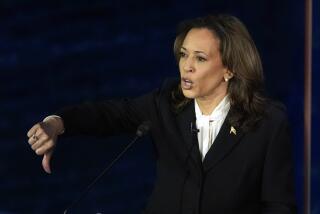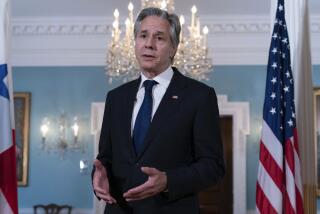White House Wary of Meddling in Poland
KENNEBUNKPORT, Me. — Senior White House officials, watching the suddenly shifting developments in Poland from this coastal village where President Bush began a late-summer vacation, sought Thursday to encourage the establishment of a non-Communist government in Warsaw while avoiding the appearance of meddling.
“The sensitivities are everywhere,” said one official. His statement reflected concern at senior levels that the continually emerging strength of the Solidarity-led opposition is a favorable development--but one that also increases the fragility of Poland’s political status.
“We would not want to do anything or say anything to upset the apple cart . . . in terms of the progress they’re making,” White House Press Secretary Marlin Fitzwater said.
In Washington, meanwhile, State Department spokesman Richard Boucher cautiously urged the Soviet Union to keep its hands off Poland.
Although the United States has no evidence to indicate Soviet interference, he said, the history of Soviet-Polish relations gives reason for concern.
“What about the Soviet attitude?” Boucher said. “That’s where I would invoke history and other factors to say that the basic principle for us of non-interference applies for everyone else as well.”
His remarks raised, but did not mention directly, the specter of the Soviet military operations that crushed democratic movements in Hungary in 1956 and Czechoslovakia in 1968, even as Soviet reforms have propelled the related reforms in Poland this year.
The President, who spent the morning aboard his twin-engine boat with two of his four sons and the afternoon on the golf course, did not comment.
Fitzwater said the disclosure that Polish President Wojciech Jaruzelski, the former Communist Party leader, has approved steps that could lead to a non-Communist government leave “many unanswered questions.” He said the White House would have “no direct comment until there is much clearer direction on what happens next.”
Another senior official, speaking on condition of anonymity, remarked:
“The United States is not backing away from the principles of democracy it has always espoused, but in terms of how they (the Poles) go about forming a new government--that is not something for the United States to get involved in.”
Fitzwater, speaking with reporters, said Bush had “no direct involvement” in the developments in Poland and had no contact with Soviet President Mikhail S. Gorbachev regarding the situation.
But, he said: “We do encourage and support the process of pluralism, and it appears that that is the general direction that they are aimed. Certainly, a non-Communist government would be a remarkable and history-making occurrence.”
As part of the encouragement that it is offering Poland, the Bush Administration will send to Congress next month proposed legislation that would make available $100 million for Poland and $25 million for Hungary. The President pledged this aid during his visits to Warsaw and Budapest last month.
One senior official, speaking privately, said the U.S. government’s approach is built around securing a change “that works.”
“If Solidarity takes over, you want some assurances that they can do it,” he said. “If Jaruzelski stays, the trick is making sure Solidarity is involved. At the same time, you don’t want to alienate the Soviets.”
White House officials have been clearly impressed with Lech Walesa’s performance, with one senior aide commenting that the Solidarity movement leader “really has his head on straight.”
Times staff writer Norman Kempster, in Washington, contributed to this story.
More to Read
Get the L.A. Times Politics newsletter
Deeply reported insights into legislation, politics and policy from Sacramento, Washington and beyond. In your inbox three times per week.
You may occasionally receive promotional content from the Los Angeles Times.










